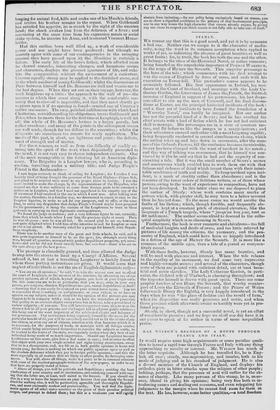STA SLY.
WE cannot say that this is a good novel, and yet it is by nomeans a bad one. Neither can we assign to it the character of medio- crity, using the word in its common acceptation when applied to works of art, as indicating the absence of great beauties as well as great faults ; for, in truth, the book has both the one and the other. It belongs to the class of the Historical Novel, or rather romance; being founded on the remarkable imposture of PERKIN AVARBEeK, in the reign of HENRY the Seventh. This singular personage is the hero of the tale ; which commences with his first attempt to win the crown of England by force of arms, and ends with his execution on Tower-hill. This pretender's course appears to be accurately followed. His first appearance in Ireland, his resi- dence at the Court of Scotlani, and marriage with the Lady Ca- therine Gordon, the kinswoman of James theyourth, the Scottish invasion of England in support of his pretensions, his last despe- rate effiwt to stir up the men of Cornwall, and his final discom- fiture at Exeter, are the principal historical incidents of the book : and a finer set of incidents to have formed the foundation of a " Waverley Novel," can hardly be imagined. But our author has not the powerful hand of a Scow ; and he has overlaid his chief events with a load of fiction which be has not had sufficient skill to manage. His personages are in a state of constant mo- tion, and flit before us like the images in a magic-lantern ; and their adventures succeed each other with a most fatiguing rapidity, being frequently conducted in several simultaneous chains, which the author takes up and lays down in succession, after the man- ner of the Orlando Farioso, till the confusion becomes inextricable. SCOTT has been charged with the want of incident in his novels ; and this way of talking was so common, that he himself was con- vinced by it (for he said so) that he had not the capacity of con- structing a tale. But it was the small number of Scorr's scenes and occurrences which enabled him to work them out with that fulness and richness of' detail which invest them with their inimi- table semblance of truth and reality. To heap incident upon inci- dent, is a mark of sterility rather than abundance; and is the resource of the lower orders of fictitious writers, or of those whose powers, owing to the want of experience in composition, have not yet been developed. In this latter class we are disposed to place the author of Stanly ; whose work contains many marks of powers which, with greater skill, he may turn to a better account than he has yet done. To the same cause we would ascribe the faults of his diction; which, though forcible, and frequently elo-
quent, is kept at a constant pitch of strained elevation, like the language of a French tragedy, where " jusqu'au bon jour, tout se dit noblement." The author seems afraid to descend to the collo- quial simplicity which is so charming in Scow.
Furthermore, the book is over romantic and chivalrous—too full
of mail-clad knights and deeds of arms, and too little relieved by pictures of life among the citizens, the yeomanry, and the pea- santry of England, which could have been so happily introduced in a fiction of the age of HENRY the Seventh. It is more like a romance of the middle ages, than a tale of a period so compara- tively recent.
With these faults, however, Stan/y has many beauties, and
will be read with pleasure and interest. When the tale relaxes in the rapidity of its movement, we find some very impressive and highly-wrought scenes; and several of the characters, though none of them are painted with sufficient detail, are at least beau- tiful and noble sketches. The Lady Catherine Gordon, in parti- cular, the ill-fated with of Warbeck, is charming throughout; and the impostor himself is drawn with great spirit. There are some graphic touches of our henry the Seventh, that worthy counter- part of Louis the Eleventh of France; and the Prince of Wales (afterwards Henry the Eighth), is very happily introduced in the days when he was "the glass of fashion awl the mould of form," when his disposition was really generous and noble, and when i those passions which afterwards awoke so terribly were yet n pro- found repose.
Stanly, in short, though not a successful novel, is yet an effort of consislerable promise; and we hope we shall one day have it in our sower to speak of its author in terms of more unqualified praise.


























 Previous page
Previous page